By Kelly Martinson, Program and Policy Coordinator, DNR Forest Products Team
Governor Tony Evers proclaimed the third week in October as Forest Products Week in Wisconsin to recognize forests’ essential role in the state’s environment and economy. This week celebrates Wisconsinites who work in the forest products industry while considering the many ways forest products can improve our lives. Forest Products Week also highlights Wisconsinites working in and caring for our state’s forest land.
Wisconsin’s Forests And Forest Products Industry
Wisconsin is home to 17 million acres of forestlands and millions of urban trees, which enhance the quality of life in our state.
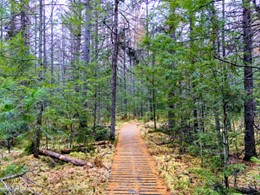
(Wisconsin DNR Photo)
Forests provide many economic, social and ecological benefits to the people of Wisconsin and worldwide. Some of these benefits include wildlife habitat, carbon storage, reduced stormwater runoff, temperature moderation and providing natural, renewable materials for forest products. We utilize forest products like wood furniture, cardboard, liquid smoke and firewood in our everyday lives.
Using forest products helps ensure the future of sustainable forestry. The choice to use forest products is all around us. From small everyday choices to long-term investments, our decisions as consumers have an impact on forest markets. When we choose forest products over substitute materials, we are helping support sustainable forestry.
Markets support forest management which makes choosing forest products important. It is vital for the health of the forest to be managed sustainably over time with stand improvement actions like thinning and harvesting trees. When there is an active market for timber, landowners have a financial incentive to follow the management plan and conduct a harvest that keeps the forest, wildlife and overall ecology healthy.
Forests are vital to our state’s economy. The forest products industry contributes $24.4 billion in goods and services and employs 61,000 men and women in forest management, logging and wood and paper manufacturing. The industry accounts for 3.6% of state employment and represents almost 11.4% of total manufacturing jobs. In 31 counties, the forest products industry is one of the top ten employers. Wisconsin’s paper industry leads the nation in employment and output, a position it has held for over 60 years. Every 100 jobs in the forest products industry sector support an additional 123 jobs in the other sectors of the economy.
It Starts With Sustainable Forestry – Menominee Tribal Enterprises
To celebrate Forest Products Week, we’re showcasing Wisconsin’s diverse forest supply chain, starting with the rich history of sustainable management by the Menominee Tribe of Wisconsin. Then we’ll highlight Wisconsin businesses that make valuable products from sustainably harvested timber from the Menominee Forest.
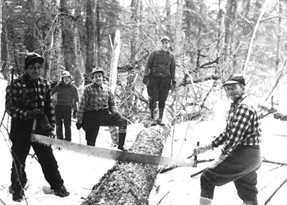
(Menominee Tribal Enterprises Photo)
Wisconsin is home to 11 federally recognized tribes, including the Menominee Tribe of Wisconsin. The Menominee Forest has been sustainably managed by the Menominee Tribe for more than 150 years and is a premier example of forest management in the world. Their management stands as a practical example of sustainable forestry: it is ecologically viable, economically feasible and socially desirable.
The Menominee Tribe has inhabited northeast Wisconsin and Michigan’s Upper Peninsula for generations, where ancestral lands encompassed over 10 million acres. In 1852, the Menominee people were confined to 235,000 acres of reservation lands. The surviving forest is still a representation of the Lake States boreal forests that existed prior to clearing for farming. Their forest management plan uses silviculture to create maximum diversity in the forest and habitat diversity and optimizes growth and saw log quality.
The Menominee Tribal Enterprise (MTE) originated in 1908 when their sawmill was built in Neopit and is owned and operated by the Menominee Tribe of Wisconsin. MTE currently employs approximately 125 people, who are mostly tribal members, and 180 woods workers. In September 2022, the Economic Development Administration (EDA) awarded a $5 million grant to MTE to construct a new building and replace equipment at the tribe’s sawmill. This will allow the tribe to upgrade its current timber and sawmill processing capacity to create approximately 50 jobs, retain 10 jobs and generate $2 million in private investments.
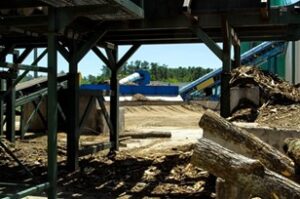
(Menominee Tribal Enterprises Photo)
MTE is Forest Stewardship Council (FSC) certified, ensuring that their products come from responsibly managed forests. Their land ethic and commitment to sustainable forest management practices are what set MTE apart from other integrated forest management. MTE wood has been a leading lumber supplier in Wisconsin for generations, offering a variety of species and cuts. Their products are used across the U.S. and internationally. They sell premium rough-cut lumber, sawlogs, high-quality veneer logs, pulp wood, firewood and wood byproducts like chips and sawdust. Their high-quality wood products are then further processed into flooring, cabinets, paper, broom blocks and more by their partners. Some noteworthy projects are the Milwaukee Bucks basketball court, made from MTE maple lumber, and the Collins recital hall in Madison, which includes wooden planking elements produced from the Menominee forest.
MTE is also committed to serving other organizations for the greater good of the forest and forest products industry. They do a lot of work with schools, such as Earth Day events and tree plantings, and they work with colleges like UW-Stevens Point and the Milwaukee School of Engineering.
“We are committed to excellence in the sustainable management of our forest and the manufacturing of our lumber and forest products, providing a consistently superior product while serving the needs of our forest, employees, wood products customers, tribal community and future generations.” – Nels Huse, Marketing Specialist for Menominee Tribal Enterprises
Custom Wood Products – Twin Oaks Lumber
Twin Oaks Lumber purchases kiln-dried lumber from MTE and other sawmills and turns it into custom products.
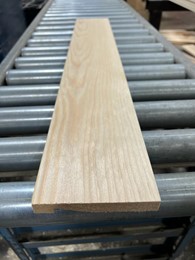
(Twin Oaks Lumber Photo)
They are a family-owned and operated business in Hazel Green, Wis., which started out in a garage in 1988 and employs 12 people today. They offer a wide variety of quality moldings, unfinished hardwood flooring and a large selection of kiln-dried hardwood and softwood lumber. Honesty and hard work are just a few of the core values that the Twin Oaks family has ingrained into their daily operations. Their most popular products are trim and can even custom-made knives to match.
“MTE has a strong commitment to the use and preservation of all their timber lands, and our partnership with MTE makes great quality lumber available to people throughout Wisconsin and beyond on a large and small scale.” – Josh Wubben, Twin Oaks Lumber LLC
Broom Blocks, Fishing Tip Ups And More – Zelazoski Wood Products
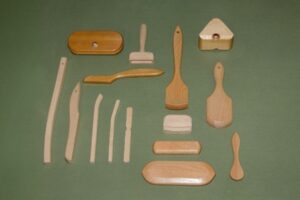
(Zelazoski Wood Products Photo)
Zelazoski Wood Products also purchases lumber from MTE and uses it to manufacture custom wood components according to their customers’ specifications. Zelazoski Wood Products is a family-owned company based in Antigo, Wis. They have been in business since 1924 and started with four employees who manufactured mostly farm-related items. Today, they employ about 20 people and use about 500,000 feet of board lumber per year to manufacture components for a variety of products such as brush and broom blocks, crutches, barbeque scrapers, grooming tools, cutlery racks and Beaver Dam Original Tip-ups for ice fishing.
“Our company has been buying lumber from MTE for as long as I can remember, and my memory goes back to the late 1950s when I would go there with my father. Being only 25 miles from the mill, we purchase all we can from MTE not only because they are so close but because they manufacture such a superb product. Besides, the ride through Menominee County is always a treat, especially when the fall colors take over.” – Ben Zelazoski, Zelazoski Wood Products
Hardwood Sports Floors – Action Floor Systems

(Action Floor Systems Photo)
Action Floors purchases maple lumber from sawmills within a radius of 100 miles, which includes MTE. Action Floor Systems is based in Mercer, Wis. and manufactures maple hardwood flooring for sports surfaces like basketball courts. They have been in business for 34 years, sell worldwide to 30 different countries, employ approximately 80 people and manufacture approximately 5 million square feet of flooring a year. Sustainability is key to Action Floors – they offer environmentally friendly products, conserve energy, maximize resource yield with full utilization of raw materials and have earned the industry’s first Carbon Negative certification based on a Life Cycle Assessment conducted by the University of Wisconsin and Carbon Clear. Many of their employees’ families have been involved in the forest products industry for two or three generations and take great pride in their commitment to sustainable forestry practices.
“Action Floors values the relationship with Menominee Tribal Enterprises immensely. We can count on receiving quality lumber. We know that their forestry practices are based on honoring their history and land, protecting their ecosystem, biodiversity and traditions.” – Tom Abendroth, President of Action Floor Systems
Advanced Specialty Papers – Ahlstrom
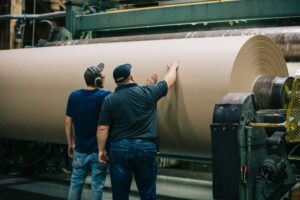
(Ahlstrom Photo)
Pulpwood and chips from MTE are sold to paper mills such as Ahlstrom, an integrated pulp and paper company with locations in Mosinee, Kaukauna, Rhinelander and De Pere. MTE provides quality third-party certified fiber to Ahlstrom, which is important to their overall business as well as their ability to meet their customer demands. In addition, their ability to procure wood at a close distance reduces their overall footprint and impact on the environment.
Ahlstrom is a global leader in fiber-based materials, supplying innovative and sustainable solutions to its customers. In Wisconsin, Ahlstrom employs nearly 2,000 employees. Their products include filter materials, food and beverage processing materials, decor papers, abrasive and tape backings, electrotechnical paper, glass fiber materials, medical fiber materials, diagnostics and energy storage solutions, as well as a range of specialty papers for industrial and consumer end-uses.
“Our relationship with MTE is certainly important to the economy because of the revenue the fiber provides as well as the jobs it helps create for both the reservation and every step of the supply chain until it reaches the end user. MTE has done a great amount of work to be innovative and ensure sustainability and forest health for many years to come.” – Brad Mischler, Wood Sourcing Specialist for Ahlstrom
Much To Celebrate During Forest Products Week
Forest Products Week is a time to recognize and celebrate the importance of Wisconsin’s forests and the people who work in them. The hundreds of forest products we use every day and their benefits are rooted in sustainable forestry and longstanding practices among the Menominee Forest, ensuring healthy and vibrant forests for present and future generations while also fostering economic prosperity, jobs and goods that benefit Wisconsinites in every corner of the state.
